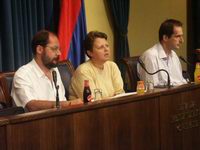- Serbia
Get to know Serbia
- Citizens
Culture and science
Health services
Pension and disability insurance
- Business
Employment
Economy
- Media
- Government
- Contact
Keep in touch
Contact form
Back
Keepin touch
Whether you have a question, comment, suggestion or any problem in the purview of the government, send us your message and we will try to respond as soon as possible. If your problem is not in our purview, we will forward your message to the relevant institution.
Q:
A:
Results of secondary technical education reform presented
Belgrade,
31 August 2004
Representatives of the Serbian Ministry of Education and Sport presented today the results and activities planned for the upcoming period within the Programme of reform of secondary technical education, launched in August 2003 by the Ministry and the European Union.
Assistant Minister of Education and Head of the Unit for the Programme Implementation Gabriela Bratic said that the European Union, through the European Agency for Reconstruction (EAR), has set aside €13 million for the programme, whose implementation will last by August 18, 2005.
The programme includes 50 schools from five different fields of study which will have, according to some estimates, a very important role in the development of Serbia in the future decades. These five areas are electrical engineering, mechanical engineering, civil engineering, agriculture and health. She added that five more technical schools in the cities where the reviving of industry is expected will be given support for the organisation of continued training of the adults.
Bratic said that new curricula have been prepared under the programme for twenty professions in three-year and four-year secondary schools in the above mentioned fields of study.
One of the new elements in the curricula is a different ratio between theoretical lectures and practical training, said Bratic, specifying that in the three-year schools the ratio will be 70 percent of practice-30 percent of theory, while in four-year schools, that ration will be 60 to 40.
She said that more than 1,200 teachers have completed the training for teaching the new education programmes, and added that a special document on the new grading system has been prepared.
Approximately €2 million from the reform programme has been set aside for the refurbishment of 49 secondary technical schools. The repair works will include roofs, electrical and heating installations, as well as the change of carpentry. She highlighted that some schools in Vojvodina will be reconstructed for the first time in hundred years.
The equipping of schools will be carried out in two phases and will cost €5.5 million. In the first phase, schools will get 1,200 computers with follow-up equipment, while in the second phase, schools will be provided with state-of-the-art equipment for each field of study.
Head of the school network Radovan Zivkov said that the goal of the reform is to change the general approach to teaching, to introduce the use of active methods, to adjust programmes to student needs and enhance their individualisation.
The programme includes 50 schools from five different fields of study which will have, according to some estimates, a very important role in the development of Serbia in the future decades. These five areas are electrical engineering, mechanical engineering, civil engineering, agriculture and health. She added that five more technical schools in the cities where the reviving of industry is expected will be given support for the organisation of continued training of the adults.
Bratic said that new curricula have been prepared under the programme for twenty professions in three-year and four-year secondary schools in the above mentioned fields of study.
One of the new elements in the curricula is a different ratio between theoretical lectures and practical training, said Bratic, specifying that in the three-year schools the ratio will be 70 percent of practice-30 percent of theory, while in four-year schools, that ration will be 60 to 40.
She said that more than 1,200 teachers have completed the training for teaching the new education programmes, and added that a special document on the new grading system has been prepared.
Approximately €2 million from the reform programme has been set aside for the refurbishment of 49 secondary technical schools. The repair works will include roofs, electrical and heating installations, as well as the change of carpentry. She highlighted that some schools in Vojvodina will be reconstructed for the first time in hundred years.
The equipping of schools will be carried out in two phases and will cost €5.5 million. In the first phase, schools will get 1,200 computers with follow-up equipment, while in the second phase, schools will be provided with state-of-the-art equipment for each field of study.
Head of the school network Radovan Zivkov said that the goal of the reform is to change the general approach to teaching, to introduce the use of active methods, to adjust programmes to student needs and enhance their individualisation.
-
 Belgrade, 26 November 2025
Belgrade, 26 November 2025Serbia-Hungary partnership best example of European cooperation
-
 Belgrade, 22 January 2025
Belgrade, 22 January 2025Egypt one of Serbia’s closest partners on international stage
-
 Belgrade, 9 July 2024
Belgrade, 9 July 2024Support for 104 associations in diaspora that preserve Serbian language, culture
-
 Belgrade, 15 April 2024
Belgrade, 15 April 2024Competition for StarTech grants open until 31 May
-
 Belgrade, 2 October 2023
Belgrade, 2 October 2023Serbia respects Resolution 1244 and will do everything to preserve peace
-
 Belgrade, 13 September 2023
Belgrade, 13 September 2023Day of Serbian Unity to be celebrated outside borders of Serbia, Republika Srpska for the first time
-
 Belgrade, 8 August 2023
Belgrade, 8 August 2023RSD 24.2m in state aid paid out to citizens affected by storm
-
 Belgrade, 17 June 2023
Belgrade, 17 June 2023Belgrade is doing everything to preserve peace in Kosovo and Metohija
-
 Belgrade, 15 June 2023
Belgrade, 15 June 2023Slovenia will continue to support Serbia on its way to EU
-
 Belgrade, 5 May 2023
Belgrade, 5 May 2023Emergency measures, tightening of conditions for possessing weapons


